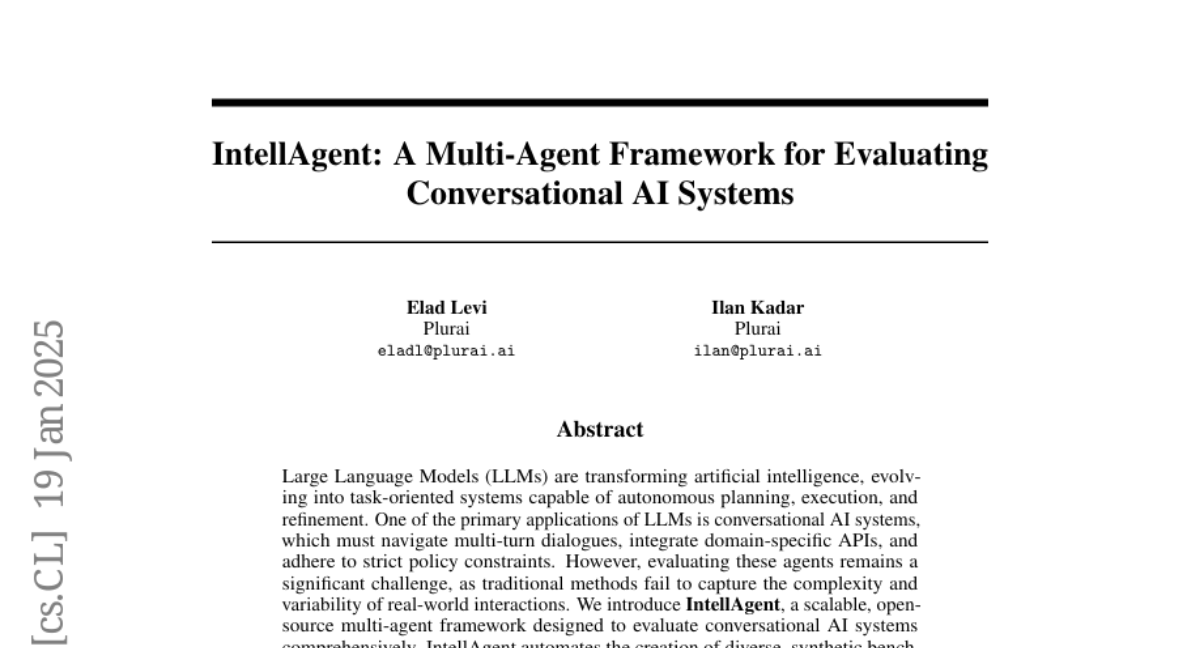IntellAgent: A Multi-Agent Framework for Evaluating Conversational AI Systems
Elad Levi, Ilan Kadar
2025-01-23

Summary
This paper talks about IntellAgent, a new way to test and improve AI chatbots and virtual assistants. It's like creating a virtual playground where AI assistants can practice talking to people in all sorts of different situations.
What's the problem?
AI chatbots and virtual assistants are getting really smart, but it's hard to tell how good they actually are at having real conversations. The current ways of testing them don't capture all the complex ways people might talk or the different rules the AI needs to follow. It's like trying to judge how good a person is at talking by only listening to them read from a script - you don't get the full picture.
What's the solution?
The researchers created IntellAgent, which is like a super-smart testing system for AI chatbots. It creates lots of different fake conversations and scenarios for the AI to practice with. IntellAgent uses something called 'graph-based policy modeling' to make sure these practice conversations are realistic and follow all the rules the AI needs to learn. It's like setting up a bunch of different role-playing scenarios for the AI, each with its own set of rules and challenges.
Why it matters?
This matters because as AI assistants become more common in our daily lives, we need to make sure they're really good at understanding and talking to people. IntellAgent helps developers find and fix problems with their AI chatbots before they're used in the real world. It's open-source, which means anyone can use and improve it, helping the whole field of AI conversation get better faster. This could lead to smarter, more helpful AI assistants that can handle all sorts of conversations, making technology easier and more natural for everyone to use.
Abstract
Large Language Models (LLMs) are transforming artificial intelligence, evolving into task-oriented systems capable of autonomous planning and execution. One of the primary applications of LLMs is conversational AI systems, which must navigate multi-turn dialogues, integrate domain-specific APIs, and adhere to strict policy constraints. However, evaluating these agents remains a significant challenge, as traditional methods fail to capture the complexity and variability of real-world interactions. We introduce IntellAgent, a scalable, open-source multi-agent framework designed to evaluate conversational AI systems comprehensively. IntellAgent automates the creation of diverse, synthetic benchmarks by combining policy-driven graph modeling, realistic event generation, and interactive user-agent simulations. This innovative approach provides fine-grained diagnostics, addressing the limitations of static and manually curated benchmarks with coarse-grained metrics. IntellAgent represents a paradigm shift in evaluating conversational AI. By simulating realistic, multi-policy scenarios across varying levels of complexity, IntellAgent captures the nuanced interplay of agent capabilities and policy constraints. Unlike traditional methods, it employs a graph-based policy model to represent relationships, likelihoods, and complexities of policy interactions, enabling highly detailed diagnostics. IntellAgent also identifies critical performance gaps, offering actionable insights for targeted optimization. Its modular, open-source design supports seamless integration of new domains, policies, and APIs, fostering reproducibility and community collaboration. Our findings demonstrate that IntellAgent serves as an effective framework for advancing conversational AI by addressing challenges in bridging research and deployment. The framework is available at https://github.com/plurai-ai/intellagent